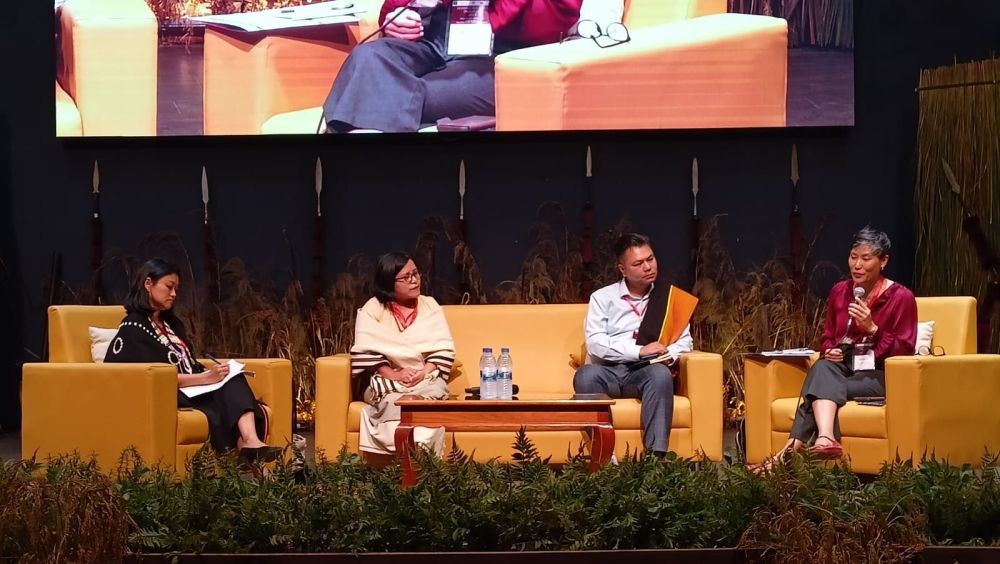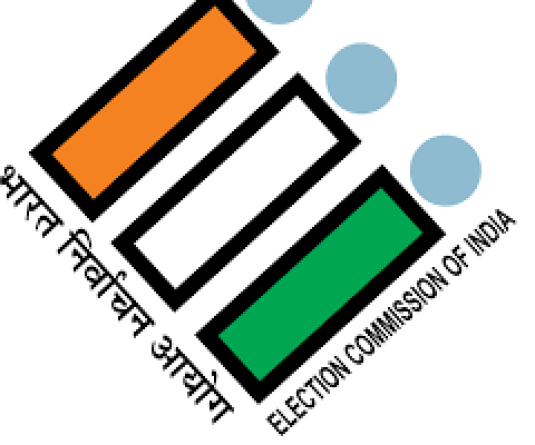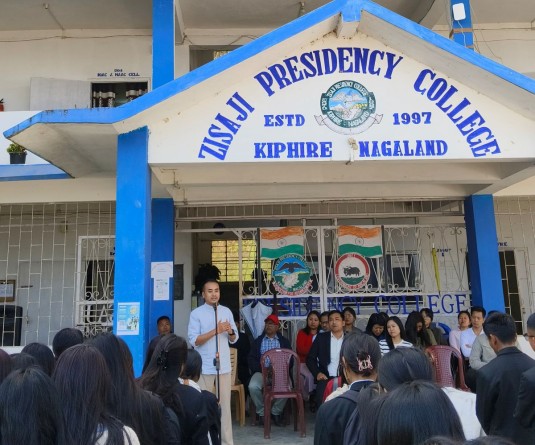(From Right) Panellists— Dr Dolly Kikon, Kevisato Sanyü, Dr Ketoukhrie-ü and moderator Dr Hewasa L Khing at the panel discussion on ‘Indigenous Communities: Shaping the future of education and pedagogy’ as part of the Leading Together: Dialogues 2023 hosted by Tetso College, Chümoukedima, November 28. (Morung Photo)

How to integrate indigenous knowledge into ‘mainstream education’
Morung Express News
Dimapur | November 28
‘Leading Together’ is a collaborative knowledge-exchange programme between the University of Melbourne, Australia, and 4 institutions in India. Nagaland’s Tetso College is also one among the Indian institutions, along with the Stella Maris College in Chennai, Savitribai Phule Pune University and the Tata Institute of Social Sciences, Guwahati Campus.
The collaboration, targeting undergraduates, focuses on bridging cultural gaps by engaging students to collaborate in knowledge-sharing, while exploring creative practices with special emphasis on empowering indigenous communities.
.webp)
According to Prof Kate MacNeill, Associate Dean, Education and Students, University of Melbourne (UoM), the initiative is part of a conscious decolonising strategy of the University by acknowledging Australia’s colonial history. It initially started as a bilateral Australia-India partnership.
“When we first started it, we thought it was a sort of bilateral Australian Indian partnership (but) it's grown to an Indian-India partnership,” said MacNeill introducing the concept of the initiative at the ‘Leading Together: Dialogues 2023,’ which begun at the Tetso College, Chümoukedima on November 28. The two-day event will conclude on November 29.
.webp)
As a traditionally “western institution,” she said that UoM has began embracing a transformative approach to education and curriculum by deepening its knowledge of indigenous culture, while recognizing the importance of education for indigenous people, who were historically denied access.
She admitted to “decolonizing ourselves” as challenging but essential to implementing strategies within indigenous policies. One notable outcome of the initiative has been to establish a ‘Global Indigenous Knowledge Center’ for advancing research and education on indigenous knowledge systems globally, she added.
.webp)
A Memorandum of Understanding (MOU) was also signed between the partner institutions for future collaborations, exchanges and partnerships.
Abu Metha, Advisor to the Chief Minister, was a special guest at the inaugural session. Metha, who is also the Chairperson of the Investment and Development Authority of Nagaland, assured of governmental assistance towards making the “dialogue stronger” and the proposed indigenous knowledge centre. “We would definitely love to collaborate with you and we will see that if there is anything we can to extend from our end, we'd love to collaborate and partner with you,” he said.
Integrating indigenous knowledge
The day featured a panel discussion on ‘Indigenous Communities: Shaping the future of education and pedagogy.’ It sought to build dialogue around the push for integrating indigenous knowledge systems into the “mainstream education” system.
It was moderated by Dr Hewasa L Khing, Principal, Tetso College and featured three discussants: Dr Dolly Kikon, Associate Professor, Anthropology and Development Studies Program, University of Melbourne; Kevisato Sanyü, Founder of NagaED and Dr Ketoukhrie-ü, Assistant Professor, Department of Political Science, Kohima College.
According to Dr Ketoukhrie-ü, the focus on “colonized or western education” in Nagaland has come at the cost of losing the indigenous knowledge system in Nagaland even to the extent of losing “our own culture and identity.” Reversing this demands a strong education policy and thereby, an academic calendar, placing emphasis on “the cultural or traditional activities,” she said.
She said that it needs directing focus on developing curricula incorporating teaching methodologies and teaching aids “which we can use in our own indigenous way.”
For Kevisato Sanyü, it would involve aligning academic pursuit with “essential skills” and “lessons for living” derived from indigenous values tailored to the needs of the contemporary world. He said that it implies equipping individuals with the necessary skills to live and work effectively and becoming contributing members not only to the village community but also to the “global village community.”
While the push is for a balanced education infused with both progressive and indigenous knowledge systems, it has placed students of indigenous communities in a rather complex situation. To paraphrase the moderator’s, “How can students reconcile their engagement with modernity and technology while remaining connected to their indigenous identity as they aspire to be global citizens?”
Dr Dolly Kikon admitted that this has been a challenging proposition, not helped by an inherited history violence and colonization. However, as students, they have to be aware of the changing environment.
She added, “Sometimes it just starts by asking very simple questions. If the colonizers knew who they were, and if the oppressors who come to exploit us know who they are so well, do we know who we are?”





